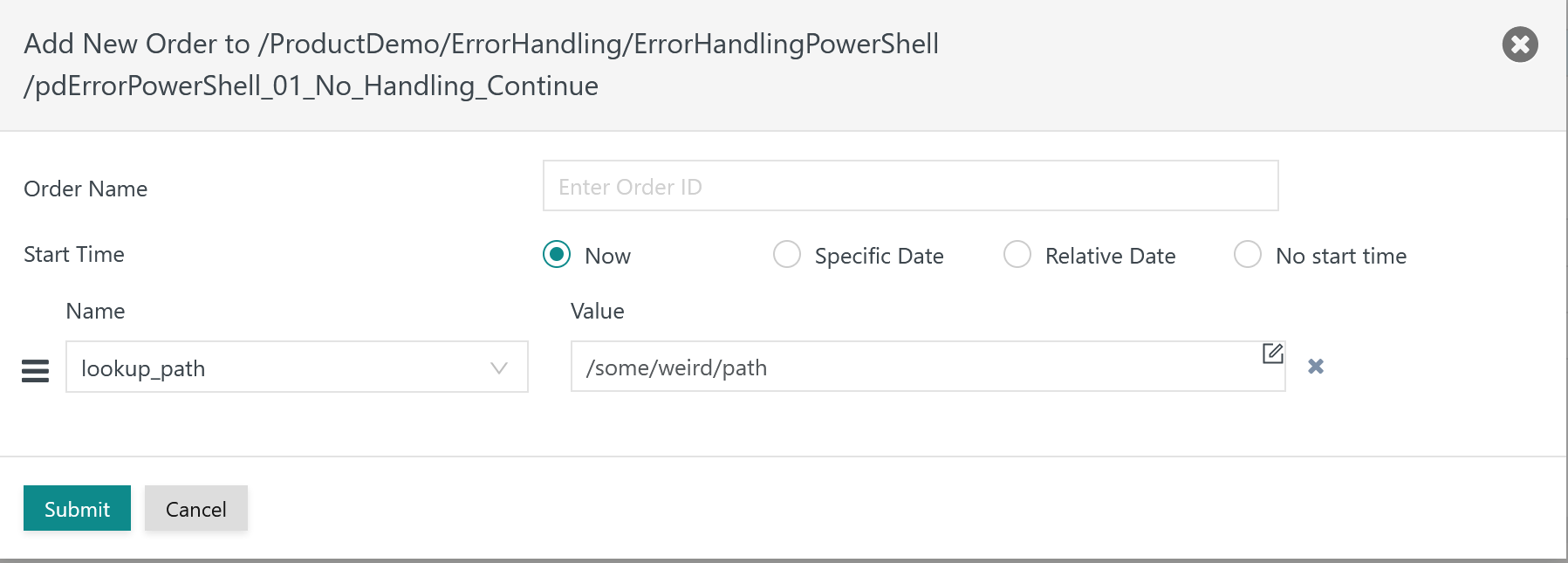Page History
| Table of Contents |
|---|
Introduction
- PowerShell® is a frequently used scripting language available for Linux, MacOS, Windows and other platforms.
- JS7 offers the JS7 - PowerShell Module for simplified access to the JS7 - REST Web Service API
- This article explains some common ways of handling run-time errors in PowerShell® job scripts.
Scenario
- The examples below use a common scenario to raise a run-time error:
- a workflow is assigned a
lookup_pathvariable that specifies a directory which is tested in a later job to see whether or not it exists. - the PowerShelll PowerShell®
Test-Pathcmdlet is used to test for the existence of the directory. The functioning of the cmdlet is that:- it returns
$Trueif the directory exists and$Falseif it does not exist, - it raises an exception if the cmdlet parameter for the directory includes a
$Nullvalue.
- it returns
- a workflow is assigned a
- In a perfect world script developers would check if a variable holds a null value before even using it. However, this world is far from being perfect. In addition, the script code required to perfectly check variables for null values would exceed by far the amount of code required for the effective processing of business logic. As a result, hardly anybody implements such checks.
- The examples below can be executed by adding an order, for example from the JOC Cockpit Workflows view in two variants:
- add the order without modification of the
lookup_pathvariable: the example will run without error, - add the order and modify the value of the
lookup_pathvariable to an empty string: an error will be raised:
x
- add the order without modification of the
PowerShell Profiles
PowerShell® profiles can be used to modify defaults available with PowerShell®.
- A PowerShell® profile will be used if available from one of the locations provided by the platform (Windows, Linux, MacOS etc., please check applicability of profiles for your platform).
- You can examine the global
$PROFILEvariable to verify applicable profile locations:PS C:\> $PROFILE | Get-MemberProfile locations typically are applied from the following properties in descending order. This means that all profiles from aall all locations are applied if available.
$PROFILE.AllUsersAllHosts$PROFILE.AllUsersCurrentHost$PROFILE.CurrentUserAllHosts$PROFILE.CurrentUserCurrentHost
- By default JS7 does not make use of a specific PowerShell® profile, instead the above order of available profiles applies.
...
This situation boils down to defaults available with PowerShell®.
- Built-in defaults of PowerShell® apply.
- Defaults that are modified by a PowerShell® profile.
Continue Processing in case of Errors
...
This is the most undesirable scenario as it implies that the PowerShell® script:
- continues and might perform very bad things, for example if a cmdlet such as
Remove-Item -Path /$env:LOOKUP_PATH -Recursewould be used with$env:LOOKUP_PATHevaluating to null. - completes with an exit code 0 signaling success if the last cmdlet executed with the script was successful. JS7 cannot know that an error occurred and users will not be notified.
...
This is a somewhat acceptable scenario as it prevents the PowerShell® script from continuing and it raises an exception that is recognized by JS7 and which will fail the job.
...
| Code Block | ||||
|---|---|---|---|---|
| ||||
#!/usr/bin/env pwsh
# global setting: stop execution in case of errors
$ErrorActionPreference = "stop"
$lookupPath = $env:LOOKUP_PATH
if ( !$lookupPath )
{
$lookupPath = $null
}
If ( Test-Path -Path $lookupPath -PathType container )
{
Write-Host "path found: $env:LOOKUP_PATH"
} else {
Write-Host "path not found: $env:LOOKUP_PATH"
} |
...
This situation boils down to defaults available with PowerShell® and to the handling of errors with jobs.
- Built-in defaults of PowerShell® apply.
- Defaults that are modified by a PowerShell® profile.
- Error detection by JS7, returning exit codes and controlling exceptions.
...
| Code Block | ||||
|---|---|---|---|---|
| ||||
#!/usr/bin/env pwsh
# use of Write-Error cmdlet
# consider the job options to fail if output to stderr is detected
$lookupPath = $env:LOOKUP_PATH
if ( !$lookupPath )
{
Write-Error "empty lookup path not accepted"
}
if ( Test-Path -Path $lookupPath -PathType container -ErrorAction stop )
{
Write-Host "path found: $env:LOOKUP_PATH"
} else {
Write-Host "path not found: $env:LOOKUP_PATH"
} |
...
Setting a non-zero exit code in a PowerShell® script performs two operations:
...
| Code Block | ||||
|---|---|---|---|---|
| ||||
#!/usr/bin/env pwsh
# use of Write-Error cmdlet
# exit script with an exit code
$lookupPath = $env:LOOKUP_PATH
if ( !$lookupPath )
{
Write-Host "empty lookup path not accepted"
Exit(12)
}
if ( Test-Path -Path $lookupPath -PathType container -ErrorAction stop )
{
Write-Host "path found: $env:LOOKUP_PATH"
} else {
Write-Host "path not found: $env:LOOKUP_PATH"
}
|
Control Exceptions with Try/Catch
Use of the PowerShell PowerShell® Try/Catch instructions offers full control of error handling in case of errors:
...
| Code Block | ||||
|---|---|---|---|---|
| ||||
#!/usr/bin/env pwsh
$lookupPath = $env:LOOKUP_PATH
if ( !$lookupPath )
{
$lookupPath = $null
}
try {
If ( Test-Path -Path $lookupPath -PathType container )
{
Write-Host "path found: $env:LOOKUP_PATH"
} else {
Write-Host "path not found: $env:LOOKUP_PATH"
}
} catch {
$message = $_.Exception | Format-List -Force | Out-String
Write-Error "error occurred: $message"
}
|
...
